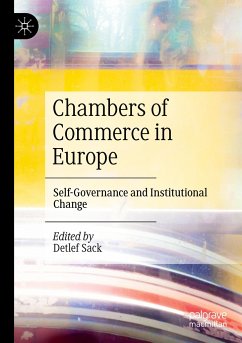Chambers of commerce are omnipresent in domestic public policy and play a crucial role in business self-governance. However, they are rather neglected in both public and scientific debates and seem to be in decline. This volume fills this gap in research on organised business and state-market coordination in Europe. The contributions discuss chambers of commerce as interest groups and actors in political systems, and address the institutional changes that this kind of self-governance is undergoing. The development of chambers of commerce in recent decades shows a wide array of mechanisms for institutional adaptation, ranging from displacement and conversion to enduring stability. This volume gives an insight into the dynamics and factors affecting these changes, with case studies on Austria, France, Germany, Hungary, Spain, and the United Kingdom, all conducted by recognised experts in this field.
Bitte wählen Sie Ihr Anliegen aus.
Rechnungen
Retourenschein anfordern
Bestellstatus
Storno








